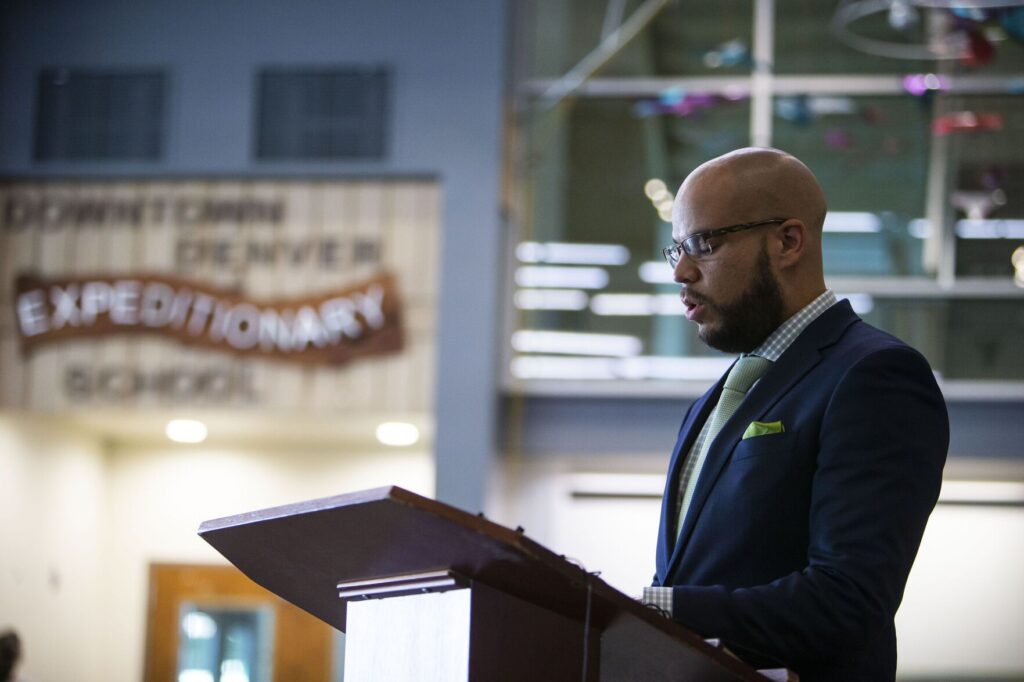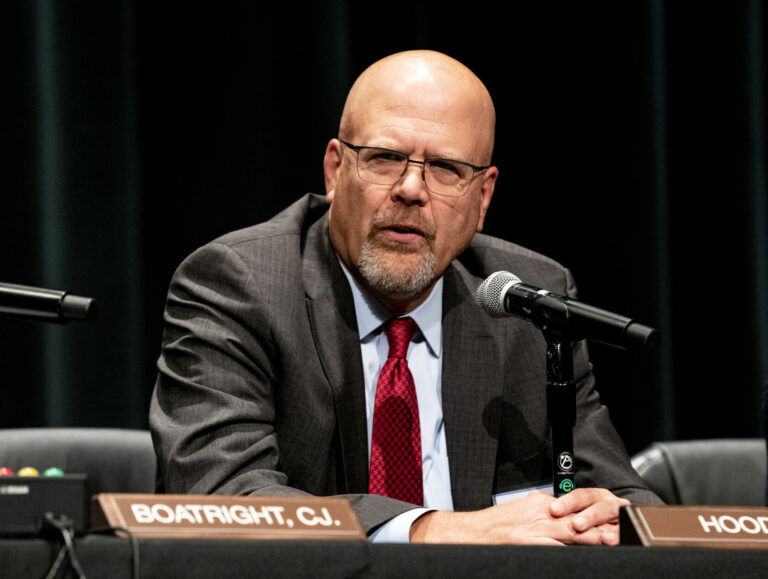Election Preview 2018 | Voters to choose new attorney general, treasurer

After the November election, besides a new governor, Colorado also will have a new chief legal officer and a new state financial manager.
The attorney general seat is open because the Republican who currently holds the office, Cynthia Coffman, ran for governor instead, though she failed to secure her party’s nomination in the primary. That nomination instead went to Walker Stapleton, the state’s current treasurer who was term limited for that office.
Democrat Phil Weiser and Republican George Brauchler are vying for the attorney general seat, while Democrat Dave Young and Republican Brian Watson are competing for the treasurer spot.
In addition, Republican Secretary of State Wayne Williams is looking to retain his position for a second term; Democrat Jena Griswold is challenging Williams.
COMING TO COLORADO POLITICS: Our Election Preview special report will appear in our Oct. 12 print edition, with stories posted online through Oct. 16, exclusively for paid CoPo subscribers.
Recent campaign finance reports filed with the Colorado Secretary of State’s Office show Democrats’ war chests largely surpassing their Republican opponents in these statewide races, but outside spending by GOP groups is more than making up for any disparity in some contests, and experts note that much could change in the remaining weeks until voting ends Nov. 6.
That fundraising trend holds true with the attorney general race. Weiser, a former University of Colorado Law Schoold dean, has raised a total of $1,698,121, well above the $612,312 raised by Brauchler, the 18th Judicial District Attorney, Oct. 1 filings show.
The Republican Attorneys General Association, however, is on its way to spending some $3 million on Brauchler’s behalf, while its Democratic counterpart at press time had yet to spend anything promoting Weiser.
> RELATED: COVER STORY | Energy, environment at forefront of Colo. AG’s race
“Attorney general is probably the most important public office that people don’t know about,” Weiser said. “It’s the lawyer for the people of Colorado.”
Weiser, also a former official in the Department of Justice under presidents Obama and Clinton, said if elected his top priority is the state’s opioid epidemic. Addictions to opioids has landed many Coloradans in jail or prison or cost and taken a toll on their health, he said. The issue has ties to law enforcement, mental health, consumer protection and more.
As attorney general, Weiser said he would follow through with a multi-state lawsuit filed this year against opioid maker Purdue Pharma by Coffman. The suit will likely end in a settlement and that money should be used to open new drug treatment facilities and support inpatient and counseling programs, among other things, he said.
Weiser said he’s concerned that if Brauchler is elected, he won’t go to bat for Coloradans if the federal government violates the constitution. This issue could arise with respect to the defense of the Affordable Care Act and opposing the separation of immigrant families at America’s southern border, he said.
> RELATED: Colo. AG candidates trade barbs, talk priorities at Denver debate
On the other hand, Brauchler said he’s concerned Weiser would only focus on “thwarting” President Donald Trump’s administration and preserving what he can of former President Barack Obama’s legacy by selectively enforcing state and federal laws.
Brauchler, serving his second term as district attorney for Arapahoe, Douglas, Elbert and Lincoln counties, highlights his courtroom experience of more than a decade and a half and expressed strong concern about Weiser’s mostly academic background.
If elected, Brauchler said he would also continue Coffman’s lawsuit against Purdue Pharma after examining the case for himself.
But his top priority, he said, would be to decentralize the attorney general’s officeby creating regional offices throughout the state. That move, he said, would expand the attorney general’s reach beyond the Front Range and provide “immediate support to the less-resourced rural law enforcement agencies,” helping them combat drug offenses and lower level environmental crimes, among other things.
> RELATED: Attorney general, congressional candidates debate at Club 20
Some of the most significant responsibilities of officials elected in November will depend on whether voters approve several initiatives that are on the ballot, said Sara Hagedorn, a political science professor at the University of Colorado Colorado Springs.
Among those measures are proposals to restrict oil and gas, pay back property owners for the impact of regulations, raise taxes for transportation and schools, rewrite campaign-finance rules, and reinvent how Colorado draws its electoral boundaries.
“(Those elected) are going to have to pick up the pieces and figure out how to put into action whatever passes,” Hagedorn said.
They’ll also likely have to deal with fallout from different Colorado communities across the state, said Robert Duffy, a political science professor at Colorado State University.
Local governments across the state have spoken against a number of different ballot initiatives, either because the proposals are vague or because they might damage cities and counties, Duffy said.
Positions on PERA
Indeed, Democratic state treasurer candidate Dave Young said balancing these financial responsibilities, and investing more than $6 billion in public money, are among the position’s chief priorities.
“Safety is No. 1; you don’t want to lose taxpayer dollars and you certainly want productivity,” Young said. “You want to make sure your portfolio is diversified enough. I want to be sure that the money is invested here in Colorado, when we can, because I believe it has a multiplier effect on our economy when we do that.”
Another high priority, Young said, is ensuring that the Colorado Public Employees’ Retirement Association, the pension system for state workers, is healthy.
Senate Bill 200, enacted in May, raised Colorado PERA’s retirement age and froze annual cost-of-living allowances between 2018 and 2019 and reduced the figure in future years from 2 percent to 1.5 percent in an attempt to chip away at the pension plan’s $32 billion shortfall over the next three decades. But Young, a state representative from Greeley, and his Republican opponent, professional real estate investor Brian Watson, agree more must be done.
Young suggested examining PERA annually and potentially supplementing any shortfall with general fund dollars.
“It’s going to take that kind of work where we really dig deeply each cycle, each session, and see if we’re on track to bringing PERA back to sustainability,” he said.
If elected, Watson said the first thing he’ll do is take the other PERA board members out to coffee or lunch to build a personal relationship with them.
“For too long in politics we’ve approached and treated people in an almost anti-human way,” Watson said. “Starting from a place of trust and ‘people over politics’ will go a long way to problem solving together.”
Watson also suggested further raising PERA’s retirement age and freezing or lowering cost-of-living allowances to address a projected shortfall.
But Young said the state already faces a shortage of public employees, particularly teachers, and further reducing their retirement benefits could drive even more out of state and discourage others from coming to Colorado in the first place.
In addition, freezing or further lowering cost-of-living allowances could cost senior retirees and plunge them below the poverty line, further costing the state, Young said.
“That means that a senior ends up on safety net services like food stamps and housing assistance and Medicaid as well as Medicare,” he said.
Watson expressed fear that Young would only continue the same approach that led to PERA’s shortfall in the first place. He also expressed concerns that Young would serve as a partisan activist.
If his opponent is elected, Young said he is concerned about conflicts of interest. Watson has said if he is elected he would maintain his position as chairman of the commercial real estate investment company he heads.
Vying over voting
In the secretary of state’s race, Democrat Jena Griswold – an attorney and first-time candidate – has outraised Republican Wayne Williams by an enormous margin, posting roughly $750,000 in contributions to the roughly $250,000 brought in by Williams, who served two terms as an El Paso County commissioner and one term as the county’s clerk and recorder.
But Williams has the advantage of incumbency, something none of the other statewide candidates can boast. On top of that, his office has won accolades for running the top operation in the country when it comes to voter security and participation – The Washington Post recently called Colorado “the safest state to cast a vote,” and the state’s share of eligible voters who are registered ranks higher than anywhere else.
What’s more, the Department of Homeland Security pegs Colorado as the model for election security, a point driven home this month when Williams helped lead a national, bipartisan training exercise for election officials.
“If people perceive a risk, they’re less likely to participate in voting,” Williams says. “We want to protect people from that threat, and we want to people to know that they are protected from that threat.”
That’s not good enough for Griswold, who faults Williams for opposing same-day registration when the General Assembly weighed whether to establish it several years ago. She’s also proposed automatic voter registration, something Williams has championed in bipartisan initiatives.
“It doesn’t matter if you’re a Democrat, a Republican, or Independent – everyone in Colorado deserves an equal opportunity to vote,” Griswold says.
Griswold charges that Williams was too quick to agree to share the state’s voter registration records with a commission on voter fraud established last year by Trump, blaming Williams for several thousand voters who cancelled their registration amid the uproar.
Williams counters that he was simply following Colorado law, which makes registration records available to anyone who requests them, including academic researchers, political operatives and journalists.
As far as other duties of the office, Williams boasts he has slashed fees and streamlined procedures, making Colorado the easiest and least expnsive state in the country to renew a business registration.
Griswold, for her part, said she wants to cut red tape and make it even easier to launch a business. She’s also proposed making the secretary of state’s office a “resource” center for small businesses and entrepreneurs.













